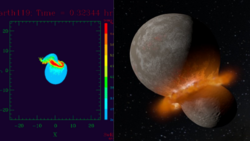Cinematic scientific visualization
Cinematic scientific visualization (CSV) is the visual presentation of scientific data in a way that is typically associated with non-scientific filmmaking techniques including cinematography, lighting, and composition. Cinematic scientific visualizations are often created for purposes of science communication to the general public, e.g. through museum exhibits and documentary films.[1] CSV is considered a subfield of scientific visualization, although the creation methods and visual outputs differ due to CSV's heavy emphasis on aesthetics and design.
Differences from Traditional Scientific Visualization
Traditional scientific visualization and cinematic scientific visualization differ in a number of important ways:
| Traditional Scientific Visualization | Cinematic Scientific Visualization | |
|---|---|---|
| Purpose | Data analysis | Science communication |
| Audience | Scientists | General public |
| Visual Style | Didactic, diagramatic | Photorealistic, cinematic |
| Development Platform | Scientific tools (e.g. ParaView, VisIt) | Visual effects software (e.g. Houdini, Autodesk Maya) |
History
The first large scale broadly-distributed cinematic scientific visualization appeared in the IMAX film Cosmic Voyage in 1996, though at the time this was simply referred to as a "scientific visualization" without the "cinematic" qualifier.[2] The term "cinematic scientific visualization" was first published by Donna Cox in 2008 referring to work created by the Advanced Visualization Lab[3] and was popularized by Kalina Borkiewicz of the same lab who published a series of papers, conference presentations, and interviews on the topic beginning in 2017.[4][5][6][7][1] The term is now widely used to describe work done by NASA's Scientific Visualization Studio,[8] Siemens Healthineers,[9] NVIDIA,[10] and others.
In 2014, the film Interstellar featured a cinematic scientific visualization of a physically-accurate black hole in a science fiction film.[11]
References
- ↑ 1.0 1.1 Borkiewicz, Kalina; Christensen, AJ; Wyatt, Ryan; Wright, Ernest (2020). "Introduction to cinematic scientific visualization". ACM SIGGRAPH. doi:10.1145/3388769.3407502.
- ↑ Cox, Donna (1996). "Cosmic Voyage: Scientific Visualization for IMAX Film". ACM SIGGRAPH. doi:10.1145/253607.253842.
- ↑ Cox, Donna (2008). Astral Projection: Theories of Metaphor, Philosophies of Science, and the Art of Scientific Visualization (Thesis). University of Plymouth.
- ↑ Borkiewicz, Kalina; Christensen, AJ; Stone, John (2017). "Communicating science through visualization in an age of alternative facts". ACM SIGGRAPH. doi:10.1145/3084873.3084935.
- ↑ Borkiewicz, Kalina; Naiman, J.P.; Lai, Haoming (2019). "Cinematic Visualization of Multiresolution Data: Ytini for Adaptive Mesh Refinement in Houdini". The Astronomical Journal. doi:10.3847/1538-3881/ab1f6f.
- ↑ Borkiewicz, Kalina (2019). "Why Cinematic Scientific Visualization is More Important Than Ever" (Interview). Interviewed by Morgan Manghera. ACM SIGGRAPH.
- ↑ Borkiewicz, Kalina (2021). "A Life of Its Own" (Interview). Interviewed by Vanessa Sochat. RSE Stories.
- ↑ Kostis, Helen-Nicole (July 30, 2019). Conversations at SIGGRAPH 2019: Helen-Nicole Kostis (Conference interview recording). Virtual: ACM SIGGRAPH.
- ↑ Making the impossible possible: Meet the team who brought Cinematic Rendering to the HoloLens (YouTube). July 11, 2020.
- ↑ Leaf, Nick (June 18, 2021). Cinematic Scientific Visualization with ParaView and Omniverse (Conference presentation recording). Virtual: NVIDIA GTC.
- ↑ James, Oliver; von Tunzelmann, Eugenie; Franklin, Paul; Thorne, Kip (2015). "Gravitational lensing by spinning black holes in astrophysics, and in the movie Interstellar". Classical and Quantum Gravity. doi:10.1088/0264-9381/32/6/065001.




